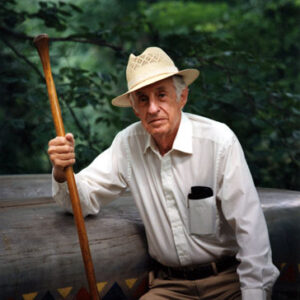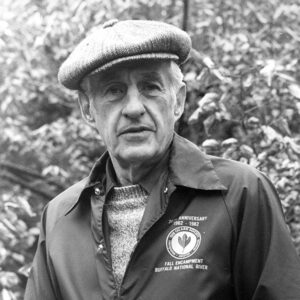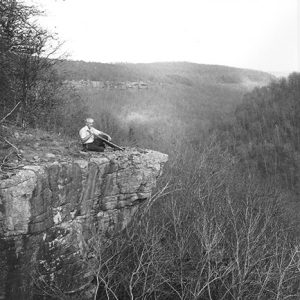calsfoundation@cals.org
Neil Ernest Compton (1912–1999)
Neil Ernest Compton of Bentonville (Benton County) was a physician of obstetrics by profession and a conservationist by avocation. He is widely recognized as the founder of the Ozark Society to Save the Buffalo River, which he and his associates initiated on May 24, 1962, at a meeting in Fayetteville (Washington County). Today, it is known as the Ozark Society, Inc. Its original goal was to stop the construction of two proposed U.S. Army Corps of Engineers dams on the Buffalo River.
Neil Compton was born on August 1, 1912, at Falling Springs Flats in Benton County, the son of David Compton Jr. and Ida Etta Wilmoth Compton. He attended elementary school at Bozarth, a rural school near Gentry (Benton County). He attended junior high and high school at Bentonville, graduating in 1931.
Compton subsequently enrolled at the University of Arkansas (UA) in Fayetteville. In 1935, he graduated with degrees in both zoology and geology. He married sweetheart and lifelong hiking and canoeing partner, Laurene Putman of Bentonville, on September 15, 1935, and the couple had three children: Ellen, Edra, and Bill. In 1939, Compton graduated from the University of Arkansas School of Medicine at Little Rock (now University of Arkansas for Medical Sciences) with a doctor of medicine degree and did his internship in Cooper Hospital at Camden, New Jersey, from 1939 to 1940. Compton began his Arkansas medical career in 1940 with the State Board of Health, serving as a health officer in both Bradley and Washington counties. His residency was in obstetrics at St. Vincent Infirmary in Little Rock (Pulaski County) from 1948 to 1949.
From 1942 to 1946, Compton served in the United States Naval Reserve with the rank of lieutenant junior grade, Medical Corps. After serving at stateside duty stations he shipped overseas for duty in the Fiji Islands, serving on Espiritu Santo, and on the island of Guadalcanal, where he ran a small hospital. After World War II, Compton continued his military service in the Ready Reserve, retiring in 1972 with the rank of captain, Medical Corps, U.S. Naval Reserve. He then began a long and successful medical practice in the field of obstetrics and gynecology. He often joked that he had “delivered enough babies to staff his own Navy.”
In the early 1960s, Compton, an avid hiker and canoeist, found himself embroiled in another type of war—a conservation battle to save the Buffalo River in Arkansas from being impeded by dams being proposed by the U.S. Army Corps of Engineers at Lone Rock (Baxter County) and Gilbert (Searcy County). He accepted the presidency of the Ozark Society to Save the Buffalo River at an organizational meeting of area conservationists in Waterman Hall on the UA campus the evening of May 24, 1962. During Compton’s twelve-year tenure as its president, the Ozark Society conducted a vigorous and eventually successful campaign to stop the construction of the two dams on the Buffalo River (Gilbert and Lone Rock) that were proposed by the U.S. Army Corps of Engineers. On March 1,1972, President Richard Nixon signed the bill that made the Buffalo River of Arkansas the first designated “National River” in the National Park System.
Compton was also a talented author and photographer. He wrote his first book in l982, The High Ozarks: A Vision of Eden, featuring photographs he made during his favorite Ozark explorations. This was followed in 1992 by The Battle for the Buffalo River: A Conservation Crisis in the Ozarks, published by the University of Arkansas Press, which was nominated for the National Book Award, and The Buffalo River in Black and White (Ozark Society Books, 1997).
He received numerous awards for his conservation work, including the coveted American Motors Conservation Award on May 20, 1964, as well as the Distinguished Arkansas Conservationist award from the Sears Roebuck Foundation and the National and Arkansas Wildlife Federation, both of which were presented on November 17, 1966. In 1973, the Ozark Society established the Neil Compton Award in his honor. Compton was appointed an honorary National Park Ranger in September 1987 by William Penn Mott, director of the National Park Service, and received the Arkansiana Award from the Arkansas Library Association in Hot Springs (Garland County) in 1993.
Compton died on February 10, 1999, at age eighty-six. His body was cremated. A portion of his ashes were buried next to his wife at Pea Ridge Cemetery, and his family placed some of his ashes in the waters of the Buffalo National River.
Today, the Ozark Society has active chapters in Louisiana and Arkansas and individual memberships throughout the nation. Its publishing arm, Ozark Society Books, publishes a variety of books on the Arkansas outdoors and environmental subjects, including the writings of Compton and other authors.
For additional information:
Compton Family Papers. Special Collections. University of Arkansas Libraries, Fayetteville, Arkansas.
Compton, Neil. The Battle for the Buffalo River: A Twentieth-Century Conservation Crisis in the Ozarks. Fayetteville: University of Arkansas Press, 1992.
Neil Compton Papers. Special Collections. University of Arkansas Libraries, Fayetteville, Arkansas.
John Heuston
Ozark Society, Inc.
 Neil Compton
Neil Compton  Neil Compton
Neil Compton  Neil Compton; 1972
Neil Compton; 1972 




Comments
No comments on this entry yet.